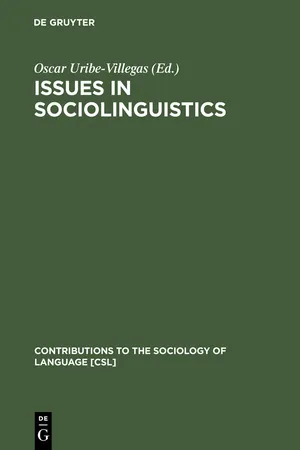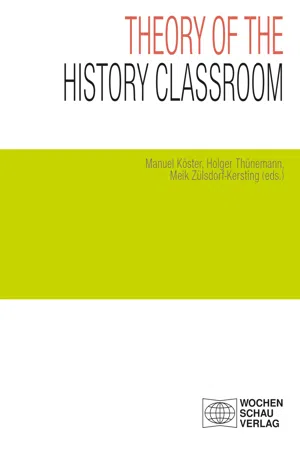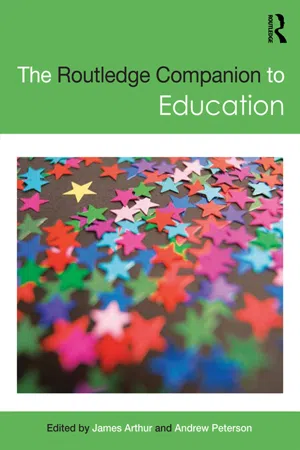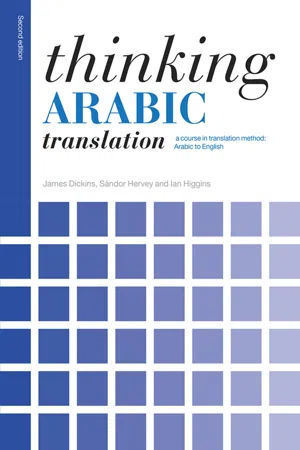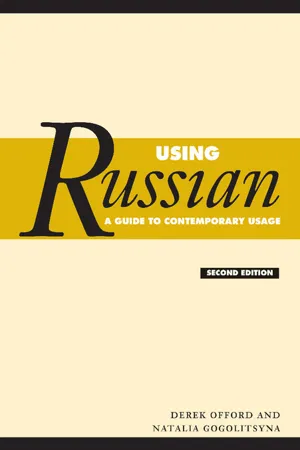Languages & Linguistics
Occupational Register
An occupational register refers to a style of language used in a specific profession or occupation. It involves specialized vocabulary, jargon, and communication norms that are unique to a particular field. In the context of languages and linguistics, understanding occupational registers is important for analyzing language use in professional settings and for effective communication within specific industries.
Written by Perlego with AI-assistance
Related key terms
1 of 5
8 Key excerpts on "Occupational Register"
- eBook - PDF
Text, Context and the Johannine Community
A Sociolinguistic Analysis of the Johannine Writings
- David A. Lamb(Author)
- 2014(Publication Date)
- T&T Clark(Publisher)
29 Halliday de ¿ nes dialect as ‘variety according to the user’ and register as ‘variety according to the use’. 30 Halliday’s understanding of register will be con-sidered in more detail below, alongside that of the American socio-linguist Douglas Biber. For both these scholars, the fundamental aspect of the register of a given text is that it carries with it signi ¿ cant informa-tion about its social context. 31 Indeed, ‘[t]he sensitivity of language to its 26 Crystal, Dictionary of Linguistics and Phonetics , p.409. 27 ‘Registers…when they are distinguished from styles, tend to be associated with particular groups of people or sometimes speci ¿ c situations of use. Journalese, babytalk, legalese, the language of auctioneers, race-callers, and sports commen-tators, the language of airline pilots, criminals, ¿ nanciers, politicians and disc jockeys, the language of the courtroom and the classroom, could all be considered examples of different registers. The term “register” here describes the language of groups of people with common interests or jobs, or the language used in situations associated with such groups.’ Janet Holmes, An Introduction to Sociolinguistics , (Harlow: Pearson Education, 2nd ed., 2001), p.246. Similarly, Wardhaugh states, ‘Registers are sets of language items associated with discrete occupational or social groups. Surgeons, airline pilots, bank managers, sales clerks, jazz fans, and pimps employ different registers’. Wardhaugh, Introduction to Sociolinguistics , p.51. 28 Ferguson draws a parallel between the systematic analysis of register varia-tions and ‘the extensive publications in German on Fachsprachen “occupational languages” and in English on “Language for Special Purposes” (mostly on commer-cial and scienti ¿ c registers of English)’. Ferguson, ‘Dialect, Register and Genre’, p.16. 29 Crystal, Dictionary of Linguistics and Phonetics , p.409. - eBook - ePub
The Vocabulary of Modern French
Origins, Structure and Function
- Hilary Wise(Author)
- 2003(Publication Date)
- Routledge(Publisher)
Although such concepts can form the basis of a useful framework for discussing variation in French, it is not difficult to think of recognisable varieties which do not fit neatly into a single category. Correspondence relating to business or administration, for example, constitutes a type of text where occupational style and register are inextricably mixed. The specialised lexis of a particular occupational group is usually involved, but register plays an important role too, in that business letters are generally forms of communication between people who have never met, and they express the respectful formality considered appropriate to the written mode, to the social distance involved and to the impersonal nature of the transaction. Beyond the usual grammatical and lexical markers of formal register, and the specialised vocabulary required for the subject under discussion, this kind of text is also marked by a range of specific formulae, especially at the beginning and end of the letter. Manuals such as Ponthier’s Le grand livre de la correspondance commerciale et des affaires (1978) help to instruct users in the implications of Cher Monsieur, as opposed to simply Monsieur, as an opener, and in the subtle nuances of nos sentiments les meilleurs, versus nos sentiments devoués or respectueux, in the closing formula. Occupational style is to an extent independent of register; in a court of law, the relevant occupational style, at least on the part of the professional participants, is necessarily going to correlate with the grammatical forms and standard pronunciation appropriate to a formal, public and indeed ritualised occasion. But two close colleagues discussing the technicalities of a court case in their office, while retaining the use of much specialised terminology, will probably use grammatical and phonological forms of informal conversation - eBook - PDF
- Oscar Uribe-Villegas(Author)
- 2014(Publication Date)
- De Gruyter Mouton(Publisher)
Indeed it is by their register range, and not by their linguistic features, that 'developed' languages are recognised and distinguished from 'undeveloped' ones (e.g., Ferguson, 1968). 198 Jean Ure and Jeffrey Ellis Nevertheless, although the fact of register and its importance, for example, in language development, is recognised now by many workers in the sociolinguistic field, investigations are still only beginning: small parts only of a very few languages have been examined, and a great deal remains to be done on the nature of the relation between language patterning and social reality. In the following paper we give a brief account of some of the methods that may be employed and some preliminary investigations. Register and language A register is a subdivision of a given language, a 'situational variety' constituted by a selection of choices from among the total linguistic options offered by that specific language. Some people use only one language on all occasions and have all their registers in one language, but there are many communities which draw on more than one language for their different purposes, and in that case a member of that com-munity will have different registers in different languages. It was in fact in relation to bilingualism that register was first observed (Gum-perz, 1959; Ferguson, 1958) and named (Reid, 1956). (The term register was introduced by Reid; Gumperz and many American lin-guists and anthropologists use the term code when discussing the same phenomena.) Thus a given speaker's idiolect may consist of a repertory of registers drawn all from one language or from entirely different lan-guages and/or from dialects of the same language. Different dialects of the same language may include different local varieties of the same language and also different social varieties (Ellis, 1965). Register, as we have said, is a norm that obtains in a particular language community. - eBook - PDF
- Joshua A. Fishman(Author)
- 2012(Publication Date)
- De Gruyter Mouton(Publisher)
It is not surprising, therefore, that up to now we know very little about the various registers of spoken English. Even studies of the written language have only recently begun to be made from this point of view. For this reason we are not yet in a position to talk accurately about registers; there is much work to be done before the concept is capable of detailed application. While we still lack a detailed description of the registers of a language on the basis of their formal properties, it is nevertheless useful to refer to this type of language variety from the point of view of institutional linguistics« There is enough evidence for us to be able to recognize the major situation types to which formally distinct registers correspond; others can be predicted and defined from outside language. A number of different lines of demarcation have been suggested for this purpose. It seems most useful to introduce a classification along three dimen-sions, each representing an aspect of the situation in which language operates and the part played by language in them. Registers, in this view, may be distinguished according to field of discourse, mode of discourse and style of discourse. 'Field of discourse' refers to what is going on: to the area of operation of the language activity. Under this heading, registers are classified ac-cording to the nature of the whole event of which the language activity forms a part. In the type of situation in which the language activity accounts for practically the whole of the relevant activity, such as an essay, a discussion or an academic seminar, the field of discourse is the subject-matter. On this dimension of classification, we can recognize registers such as politics and personal relations, and technical registers like biology and mathematics. There are on the other hand situations in which the language activity rarely plays more than a minor part: here the field of discourse refers to the whole event. - eBook - PDF
- Manuel Köster, Holger Thünemann, Meik Zülsdorf-Kersting(Authors)
- 2022(Publication Date)
- Wochenschau Verlag(Publisher)
We advance the proposition that the linguistic dimensions of history in the classroom exist in a perpetual state of tension between enabling communication and understanding, and increasing the potential for contingent classroom events . As we show, this enables many of the students’ empirically doc-umented problems with historical learning to be interpreted as difficulties in dealing with the interplay between the different languages of history in the class-room . 7.2 Dimension 1: registers One key constituent of classroom education as a social system is linguistic com-munication . Linguistic communication in the classroom is specifically different from other situations involving communication . English-language sociolinguis-tics developed the term “register” (cf . Linke/Nussbaumer/Portmann 2004, 338) to describe such specific communication situations . When German-language sociolinguistics was becoming established as a discipline, it focused on the “ influ-ence of social factors on language or linguistic behaviour” (ibid ., 345, italics in orig-© Wochenschau Verlag, Frankfurt/M. 167 inal) and created the term Varietät (variety) to describe the link between linguis-tic idiosyncrasies and social groups . While the term “register” describes specific communication situations (cf . Hymes 1989, 440); varieties can be described in terms of the interaction between geographical difference (diatopic), difference based on social background (diastratic) and stylistic difference (diaphasic) (cf . Gantefort 2013, 80) . Registers are mainly defined based on their diaphasic features, although this frequently goes hand in hand with a high level of dias-tratic marking, i . e . association with certain groups of speakers (cf . Riebling 2013, 110 – 114) . The situation-specific use of different registers is the focus of Michael Hal-liday’s functional grammar or systemic-functional linguistics (SFL) . - eBook - ePub
- James Arthur, Andrew Peterson, James Arthur, Andrew Peterson(Authors)
- 2013(Publication Date)
- Routledge(Publisher)
First, students are less likely to learn the skills they need from daily classroom experiences, such as how to use reading and writing to engage in new ways of thinking. Second, because their participation in classroom activities is significantly reduced, they do not benefit as they should from interactions with peers and teachers (Wilkinson and Silliman, 2008 ; Francis et al., 2006). Third, this reduction in participation subsequently interferes with the development of identity formation as a student in school learning communities (Christian and Bloome, 2004 ; Danzak and Silliman, 2005.) The distinction between the everyday oral language register and the more specialized register of academic language is a critical one; these differences are shown in Table 14.1. Table 14.1 Academic language register and everyday oral language register Everyday oral language register Academic language register Vernacular discourse varieties that are more oral Specialist discourse varieties that are more literate Primary language abilities Secondary language abilities and advanced literacy-related language abilities Typical of face-to-face conversation Typical of the discourse of schooling, including: textbooks, standardized tests, composition, and selected teacher-talk Not sufficient for academic achievement Necessary for academic achievement (Adapted from Wilkinson and Silliman, 2008) These discourse registers, each of which is characterized by its own vocabulary, syntax, degree of formality, and social context, are simultaneously interdependent and independent (Cummins, 2000). While it is possible to “code switch” from one register to the other in a relatively seamless manner (the interdependent dimension), each register can be used separately (the independent dimension) in both the oral and the written domains (Reyes and Ervin-Tripp, 2010) - eBook - PDF
Thinking Arabic Translation
A Course in Translation Method: Arabic to English
- James Dickins, Sándor Hervey, Ian Higgins(Authors)
- 2016(Publication Date)
- Routledge(Publisher)
For many other speakers, however, this style of lan-guage would be a function of tonal register; it is a form of language that they would only use when they were deliberately adopting a tone of formality and authority. Second, characteristics of particular social registers often include features of tonal register. ‘The boys done well’ said by a football manager to a television interviewer after a winning match not only re fl ects a social persona of the manager as ‘down-to-earth’ and ‘straight-speaking’ but is also an instance of a tonal register in which the manager presents himself as an authoritative but kindly father fi gure. In the case of Standard Arabic, it is easier to identify tonal register than it is to identify social register. The intrinsic formality of Standard Arabic makes it dif fi cult to establish clear links between the kind of language used and social stereotypes. In translating Standard Arabic into English, however, this does not mean that social register should necessarily be ignored. In order to achieve a form of English that is contextually acceptable, it may be necessary to impose a social register on the translation, even where there is no obvious social register in the ST. In cases where it is impossible to disentangle tonal and social register without lengthy analysis, it is acceptable for translation purposes simply to use ‘register’ as a cover term. 15.3 Sociolect We turn now to three language varieties that might be termed ‘sublanguages’, because they can, for some people, constitute a complete language (i.e. the only language variety they ever use). These are sociolect, dialect (‘geographical dia-lect’) and temporal variety (‘temporal dialect’). Whereas a social register belongs to a fairly narrowly stereotyped social per-sona, a sociolect is de fi ned in terms of sociological notions of class. A sociolect is a language variety typical of one of the broad groupings that together constitute the ‘class structure’ of a society. - eBook - PDF
Using Russian
A Guide to Contemporary Usage
- Derek Offord(Author)
- 2005(Publication Date)
- Cambridge University Press(Publisher)
8 1.3 Registers As for field, language is affected by subject-matter in an obvious way, inasmuch as fields of activity and branches of knowledge have their special terminology, for example, political, philosophical, scientific, medical, musical, literary, sporting, professional and so forth. However, the effect of field on language may go further than terminology. Groups have distinctive ways of expressing themselves: doctors, for example, are likely to describe patients’ symptoms in language altogether different from that used by patients themselves. Finally, regarding situation, one’s mode of expression may be affected by the nature of the relationship that exists between the user and the person or people with whom he or she is communicating. Language is likely to vary according to such factors as whether one is speaking, for example, to one’s elders (with any one of a range of nuances from respect, deference, sympathy or affection to condescension or intolerance), to children (lovingly, reproachfully, sternly), to a superior or junior at work, or to an intimate or a stranger. 1.3 Registers The varieties of language that result from the interaction of the factors described in 1.2 represent stylistic levels which, in common with authors of other books in this series, we shall term registers. 3 Although the number of registers that may be identified is quite large, for the purposes of this book a scale will be used on which three main registers are marked (low, neutral and high). These registers will be referred to throughout the book as R1, R2 and R3, respectively. Beyond the first of these registers lie demotic speech ( 1.3.2 ) and vulgar language ( 5.6 ) and within R3 lie various functional styles ( функционa ´ льныe сти ´ ли ) which will be classified here as scientific or academic style, official, legal or business style, and the styles of journalism and political debate ( 1.3.4 ).
Index pages curate the most relevant extracts from our library of academic textbooks. They’ve been created using an in-house natural language model (NLM), each adding context and meaning to key research topics.


